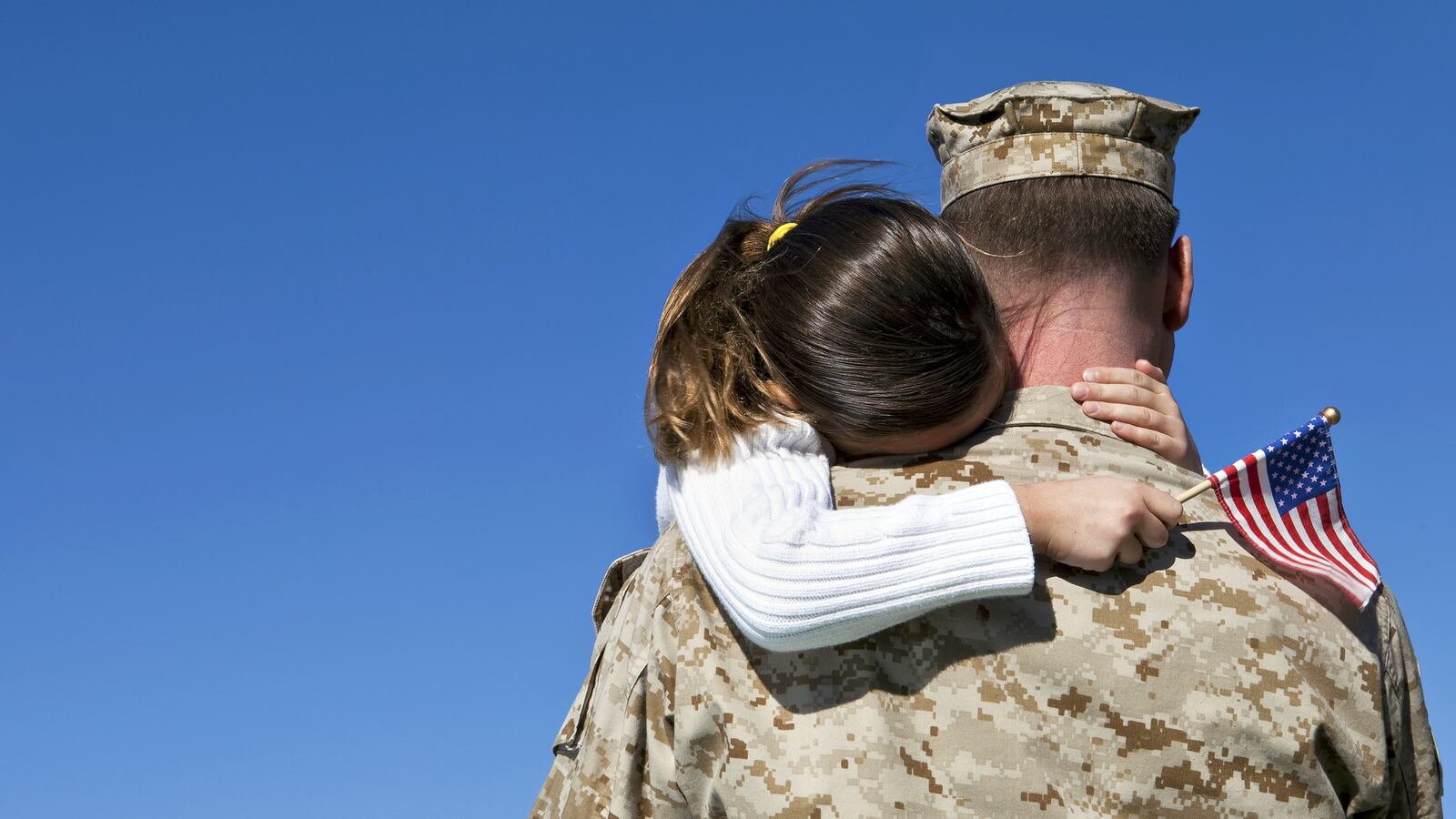For six years, Betty Easley didn’t know why her veteran husband was so angry – and so unlike the man who’d gone off to Iraq in 2003.
When her spouse, Army Specialist Greg Easley, got home in October 2005 from the second of two tours of duty, she says, “I figured, OK he’s made it back! We can work through whatever else comes.”
He’d been through a harrowing accident: in 2003, the truck he’d been driving had been flipped by an improvised explosive device (IED). Nevertheless, after minimal bed rest, he was sent back out—and then on to a subsequent deployment.
But now he finally was home from the war, and seemingly okay. But Easley quickly realized neither she nor their six children were equipped to handle the severity of his bursts of rage, which would happen randomly.
“We grew so far apart,” says the 40-year-old Easley, who’s been married to her husband for 20 years since they first met in Philadelphia through a friend. (“He saw me and said, ‘I like her; I’m gonna marry her someday,’” she recalls fondly.)
After Greg’s return, everything changed. “We didn’t have a name for what we were living with,” she says. “We were close to divorcing; it was just too much for me and the kids to bear.”
She had only heard of post-traumatic stress disorder, or PTSD, in passing. “There was little to no awareness of it,” she says.
In 2009, when a military doctor finally diagnosed her husband with the condition, she says, “that was the big a-ha moment.” He also was diagnosed with “head, neck, wrist and back injuries – and the biggest was TBI, or traumatic brain injury.”
Easley asked her husband why he hadn’t spoken up earlier. “He didn’t want to show that he was weak,” she says. “He says this is what they’re trained to do. When you’re a soldier, you keep soldiering no matter what.”
This mindset is one of the issues Easley’s hoping to change with her position as a fellow with the Elizabeth Dole Foundation, whose mission is to support military caregivers: spouses, parents, children and others who do the essential work of helping wounded service members recover after tours of duty. Easley will speak about the challenges she and her family have faced on Oct. 22 at Women in the World Texas in San Antonio. (Also appearing with her on the panel will be Janet Sanchez, founder and president of Esposas Militares Hispanas USA; Fusion TV’s Alicia Menendez, anchor of Alicia Menendez Tonight, will moderate.)
For Easley, one of the most important steps to helping her husband was learning to legitimize her own position as a caregiver. Too often, she says, the role of military wives is undervalued.
“The foundation has empowered me to know that I am a caregiver,” she says, “and that I do make a difference. There are about five million more of me out there. And we are not ‘just’ spouses.”
She had to quit her job at the air force base where they were living at the time, she says, to care for Greg full time. “As much as I wanted to work, he needed me. So I had to step down.”
In addition to being in charge of her husband’s medication and doctor’s appointments, she also has to manage the symptoms of his PTSD. “Kids will run and play and make loud noises,” she says. “It was never a big deal before, but when he first got back, certain toys would throw him into a rage.”
Food was another issue, because the Iraqi civilians he encountered were so poor and had so little. “He was greatly affected by that. When he got back home, he became so hard on the children for wasting food,” she says.
“I often had to step into the middle of a situation, like a referee. When he’d leave the house, the kids would ask, ‘Why does he hate us?’ But it wasn’t that he hated them, it was that he was dealing with these issues.” Once Easley learned to recognize the triggers, she says, their lives improved markedly.
Now living in their own house in Killeen, Texas, thanks in part to Operation Homefront in partnership with the foundation, they’re slowly trying to put their lives together again. Easley is earning money for the family as a part-time caregiver, through the Veterans Administration.
“I know we’ve still got a long way to go,” she says. “But spouses and caregivers have become more important now. Because the injured service member is not always going to come out and tell you the things that are wrong.”
Reaching out to other caregivers through her fellowship, she says, she’s seen the palpable relief others feel as the veil of secrecy is lifted from conditions like PTSD, and as the job of military caregiver is given the respect it deserves.
“You’ll see women break into tears, just knowing they’re not alone,” says Easley. “We are recovering from the war, and these are real issues. We are people who understand: Your husband isn’t a bad, horrible monster because he gets angry. We’ll be OK.”






